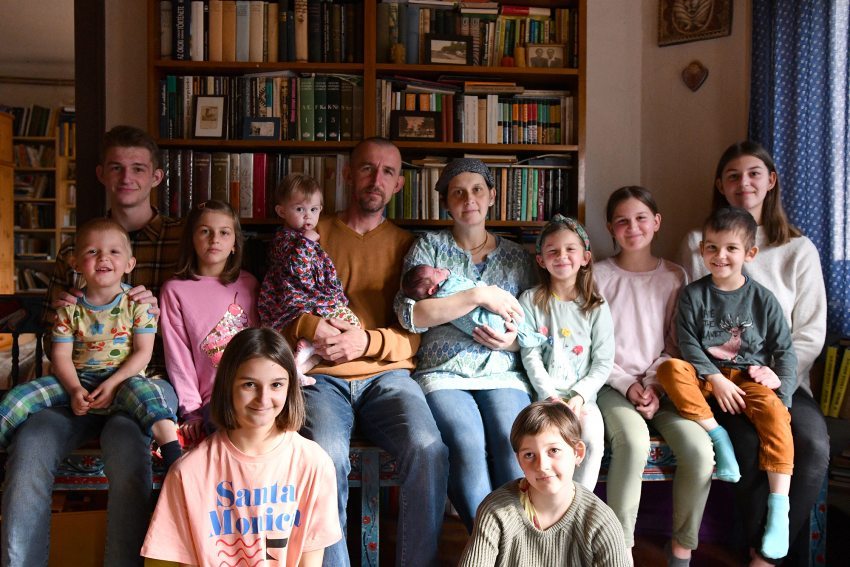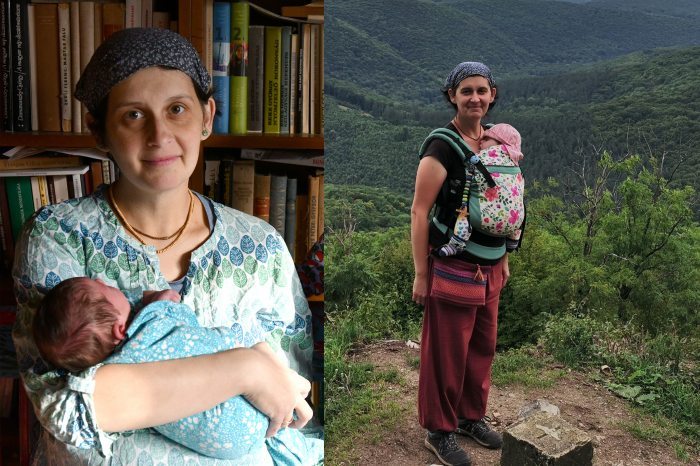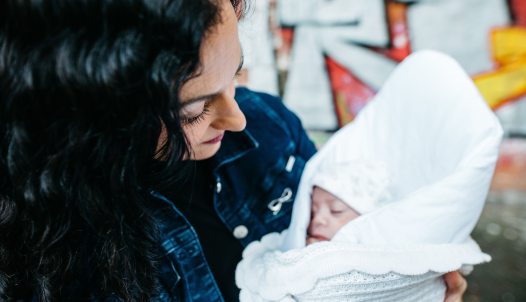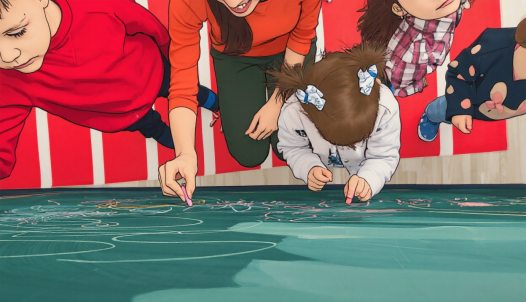"I felt at home among the Afghans, too" - She has eleven children and helps people in need
She gave birth to eleven children, she has never let herself go, only indifference and disregard for human dignity exasperate her. Since her adolescence, Eszter Darvas-Tanácsné Novák has been touched by difficult fates and has always striven to do what she can - even when it is impossible. Most recently, she collected and delivered warm clothes to people staying at the reception center in Balassagyarmat. Most of them fled Afghanistan empty-handed.

The railway station in Ercsi is not a particularly attractive place. It's particularly bad on a cold, rainy morning in mid-October: you're already shivering from the all-encompassing grey. It's a relief to see the blue steeple of the Reformed church and the welcoming parish building after a 20-minute walk. This is where Erik Darvas-Tanács and his wife Eszter raise their eleven children: the eldest is 19, the youngest seven months old. "It's a woman's world," says the mother with a wry smile, since eight of her eleven children are girls. The only boy at home, four-year-old Jonas, is busy with a memory game, his two sisters are asleep, and the other eight children are at school or kindergarten. "It's also a civic shock that there are so many of us, most people are already asking parents with four children if they wanted the youngest. You can imagine what they think of us."
Both Eszter and Erik are only children, but there was no question that they wanted to live in a big family.
"People ask how we can listen to all our children, how we can pay attention to them. I don't know, but we do it because it's just the task we’re given. Twenty-four hours is usually enough," says Eszter.
You have to laugh with her at that.
It's not just the children, the household, and the ministry that need to fit into the day: Eszter has organised and run several large-scale fundraising events in recent years. "Our first big collection was in the winter of 2004, we took a lot of donations to Petrozsény. As we didn't have any permits, they didn't want to let us cross the border. I don't know what was more surreal: stopping to argue with the Romanian border guard or travelling at night on the serpentines in pouring snow. Interestingly, none of us were afraid, we simply knew that there was no turning back, that we had to do this now," she recalls. Four years ago, she organised a Facebook fundraiser for forgotten children in Transcarpathia who were abandoned in hospital by their parents after they were born, and most recently, she was moved to action by the fate of five hundred and seventy Afghan citizens who were delivered to our country.
Action-starting images
"From the first news reports of the Taliban takeover, I felt I would have to deal with this story. Then I saw a report about the refugees in the reception centre in Balassagyarmat, and I had the feeling that something had to be done" Eszter says of the beginning. She called for a collection, which was joined by more than 200 people, including many Muslims who had been living in the country for years. The initiative has grown into an uplifting and inspiring coalition. Then, of course, came the obstacles. For unforeseen reasons, the handover had to be brought forward by a week, a driver had to be found for one of the vans, and it turned out that they would not be granted access to the reception centre after all. But Esther could not be dissuaded.
"I couldn't think of anything except that I had to go ahead until I handed them the coats and shoes, for example, and saw that there was something for each child's feet, and they were walking away smiling, with some nice toy under they arms."
Nothing is by chance
In hindsight, it always turns out that the hardships were worth it: thanks to the early handover, we managed to get everyone warm clothes before the cold weather arrived. With the help of a local NGO, they found a shop in the city centre where they could place the donations and where the residents of the shelter could come out. "I can tell you, we were quite an unusual sight as we were packing the bags with our occasional driver, a deeply religious gypsy musician, and the women and children started to come over. It was moving to meet them and see in their eyes the traces of what they had been through. Here in Hungary we can't imagine what it's like to have to decide almost overnight, within ten or twelve hours, whether to go or stay," says Eszter.
A chance for a better life?
At the handover, she had time to talk to several people, to listen to why they had come and what they had left behind. The most heartbreaking was the story of a little boy who was staying with a family at that time and that family had no time to take him home, it was all so sudden. "His parents say it's good that it happened this way, because it gives him a chance for a better life - but it was hard to see and deal with the separation."
”God bless you”
The collection has since been suspended, but there is not a day that goes by that Eszter doesn't recall a moment from one of her encounters. "It was fantastic to be hugged by all the families as they left. The women were cute when they were touched by a sparkly ornament or a little kindness, and they were very touched that we collected headscarves for them. The children were delighted with the toys - it eased a little of the uncertainty they have to endure.
I was also impressed by their discipline: everyone took only what they absolutely needed. It was good when the male members of the group said "God bless you".
I felt that it is not only what they bring is new for us, but also everything they encounter here is new to them. For all of us, the encounter and conversation was eye- and soul-opening."
Eszter is often asked why she keeps getting involved in projects like this, if the many tasks given to her by her family and church are not enough. She says she feels she simply cannot help herself, because she believes there is nothing more important than listening to the voice of conscience. Moreover, the whole family is involved in fundraising. The children involve their schoolmates and often take part in the organisation with an enthusiasm and drive that belies that of adults. They help not only those from distant countries, but also those who live near them in difficult circumstances: they have even given their own shoes to a gypsy child so that they could wear them to school.
We must move towards each other
"I was thirteen when I was called to the ministry. From the very beginning, this vocation was linked in me with a social sensitivity, because mercy, turning towards others, is not a right, but a grace to experience. When I was fourteen or fifteen, for example, I announced to my parents that I was going to spend three weeks in Dunaalmás to help out in the nursing home there. I had wild ideas as a teenager: first I wanted to be a missionary in a third world country, then I wanted to join the Missionaries of Charity, and then I wanted to work with handicapped children. I don't know why it is, but what frustrates me the most is the callousness - when people don't dare, don't want to come out of their bubble and face the reality around them. If one sees the plight of people in the world day after day, one simply has to be critical of the passive, indifferent, dismissive voices, often disregarding the dignity of people, which want to be louder than the voices of mere goodwill, of wanting to help or of Jesus-like love. We must therefore also be ever louder, because it is impossible not to notice someone in crisis. It pains me to see Hungary locked in fear and the hatred that comes from it, when what we need is not to be afraid, to be cocooned, to shut ourselves off, but to move towards each other, even if we have to overcome ourselves, for our own spiritual well-being."
When we turn to others with openness and trust, we experience that we are equal to the other person. This always results in something good, a whole new quality of life - something Eszter experiences regularly. During the recent collection, she met many Muslim mothers and groups with whom she was able to interact in great harmony and enthusiasm, respecting and accepting each other's identity. "In Balassagyarmat, I spoke to a father who had worked for the Hungarian army in Afghanistan for fifteen years.
He left behind not only a life's work, but also his relatives, to escape with his nine children. Since then, they have never heard from each other. For security reasons they cannot keep in touch, fearing those left behind from reprisals.
They only had a few hours to decide whether to come or stay, and their packed luggage was lost in the mad scramble at the airport, but the point is that they made it out safe and sound. I felt very close to them, and not just because of the large number of children. We are more connected than we are separated. They are full of values that can only make us more, and even mutually enrich each other. It is important to recognise that."









